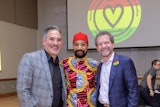WASHINGTON – It’s easy for scholars in the United States and many European nations to take for granted all of the rich academic resources at their disposal. Often, with a few simple keystrokes on a computer, they can access wellsprings of information to enhance their body of work. Not so on the African continent, where ethical and government lapses, as well as technological disadvantages, prevent scholars and others from accessing and building equitable research materials.
During one session hosted at the African Studies Association’s 54th annual meeting, which was held in Washington, D.C., this past weekend, experts discussed the challenges and promises related to creating useful archives of work and models of research and publishing in African studies.
The ASA theme this year was “50 Years of African Liberation.” The research/publishing forum provided an opportunity for historians and scholars to reassess work they have done as well as new models as many African nations examine the progress they’ve achieved and have yet to make as they prepare to celebrate 50 years of independence, explained ASA president Judith Byfield.
Dr. Derek Peterson, associate professor and director of the University of Michigan’s African Studies Center, has been working in western Uganda with the Mountains of the Moon University to organize, catalog and digitize local government archives. He offered a cautionary tale about the risks and rewards of such projects. On one hand, they produce valuable information but also offer potential opportunities for censorship.
“Digitization is not everywhere to be celebrated as a forward advance in the preservation work because it opens up archives that are complicated and politically sensitive to the supervision and editorial control of government officials and others who would like to limit the free flow of knowledge,” he told Diverse. “Digitization, in other words, makes it obvious what the secrets of the archive might be and in so doing undermines the search of ecologies of knowledge within the archive, the limits that contain government officials’ editorial power and makes it possible for those in power to seek to control what’s there, basically.”
Despite pitfalls, Peterson says, he remains hopeful and optimistic about the project.
Peter Limb, an Africana bibliographer and librarian at the University of Michigan, made a presentation about putting African historical newspapers online. So far, the content from 70 newspapers ranging between 1800 and 1922 has been put online. In addition, the World Newspaper Archive (WNA), a collaborative effort of the Center for Research Libraries and its partner libraries and Readex, are trying to expand the number of publications and years.
The African newspaper archives contain more than 325,000 pages of content from titles published in several countries, including Ghana, Kenya, Lesotho and Malawi, and in several languages, including English, German, French, Afrikaans, Xhosa and others.
“Even though we’ve made this major leap forward putting papers online across a wide range of countries and languages, we still have gaps,” Limb said. “We need to look critically at our own projects and learn from other similar projects so we can fill in more gaps.”
Some of the challenges the project has had to deal with include poor microfilm quality, indicating a need to re-scan some of the pages, copyright problems and the difficulty that African institutions have had buying materials. Commercial entities that have bought the rights to certain content also are an obstacle because of prohibitive costs associated with accessing them.
“I think we need more input from scholars and others, particularly on the question of sharing. We’re at a stage now where very few African or European libraries can actually afford this product of WNA,” Limb concluded. “We also need to rethink our models and have more cooperation with emerging repositories so we can link up and connect these different archives. We should also encourage open access guidelines in Africa for commercial publishers.”
Dr. Edward Miner, an African studies scholar at the University of Iowa-Iowa City, discussed the challenges of forming “ethical, equitable and sustainable collaborations” between Western and African institutions.
Digitization, he said, offers a lot of promise for availing scholarship to African-based scholars at their home institutions and to a global audience. But, he cautioned, there also are “risks and anxieties.”
“Digital collaborations between Western and African institutions take place in the context of a history wherein African national archive directors remember times when Africanist researchers in the late colonial period and early post-colonial period destroyed records on their way out in some places, and some unethical researchers made off with primary source materials,” he said. “These leave bitter memories.”
Miner also pointed to commercial interests that tempt African journals and archivists to make it more difficult for Western institutions to access valuable resources. He said that American research libraries can no longer afford to have each institution buy copies of everything needed by researchers, underscoring the need to be more collaborative.















